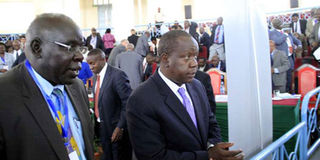Only Commission for University Education can accredit courses

Commission for University Education Secretary David Some (left) and the Cabinet Secretary for Education Science and Technology, Fred Matiang'i, at a past event. PHOTO | FILE | NATION MEDIA GROUP
What you need to know:
- Several courses in a number of universities have been suspended due to concerns about the quality of their graduates.
- The regulatory bodies have all been claiming ownership of academic programmes and charging fees to students and universities.
- CUE charges Sh640,000 for accreditation per academic programme and some professional bodies as high as Sh1 million.
Local professional bodies have been locked out of degree programme accreditation and the task handed solely to the Commission for University Education (CUE).
The Universities (Amendment) Act 2016, which was signed by President Uhuru Kenyatta last month, however, allows CUE to engage professional bodies and associations to carry out inspection of universities on its behalf.
The Auditor-General shall offer the Commission professional opinion on management and financial positions of a particular university, further states the Act.
“A person who, without the authority of the Commission under this Act, purports to license, accredit, recognise, audit, inspect, index students or collect a fee or a charge from a university or a student commits an offence and shall be liable on conviction to a fine not exceeding Sh2 million or imprisonment for term not exceeding two years or both,” states the Act.
This means that the more than 19 professional bodies — including the Engineers Board of Kenya and the Council of Legal Education — will have no role in what is taught in universities.
Several courses in a number of universities — including law, engineering, medicine and pharmacy — have been suspended due to concerns about the quality of their graduates.
The regulatory bodies have all been claiming ownership of academic programmes and charging fees to students and universities.
APPROVE COURSES
This duplication is passed on to students, making some professional courses in Kenya the most expensive in the region.
CUE charges Sh640,000 for accreditation per academic programme and some professional bodies as high as Sh1 million.
“If there is a conflict between the provisions of this Act and the provisions of any other Act in matters relating to approval or accreditation of academic programmes offered, this Act shall prevail,” the law adds.
It goes on: “Despite the provision of any other law, the recognition, licensing, student indexing, approval or accreditation of any academic programme including postgraduate degrees, diplomas including post-graduate diplomas and other academic certificates offered at a university shall be the exclusive mandate of the commission to be exercised in accordance with this section at the exclusion of any other person or body.”
The Act states that CUE may, before approving any academic programme, consult with the relevant body established by written law to regulate the profession to which the programme relates, where such law empowers the professional body to approve or accredit courses offered at any university or colleges.
The law also provides for a person serving as a member of CUE prior to the commencement of this Act to continue to serve in the capacity for the reminder of their unexpired term or for a period not exceeding three months.
After that, a new commission will be constituted, which will include chairpersons of councils of both public and private universities and representative of the Federation of Kenya Employers (FKE).
These organisations had no representation on the CUE board. Extra-curricular activities, hitherto ignored in the inspection of courses, are captured in the Act.
“The commission shall, in approving and inspecting university academic programme, analyse and consider learning content of a programme, purpose and objectives of a programmes and structures of a programmes,” states the Act.
CUE will also look at the structure of a programme, its mode of delivery, availability of academic resources to implement it, the mode of assessment, learning environment of the university, its learning facilities and also extra-curricular activities.





